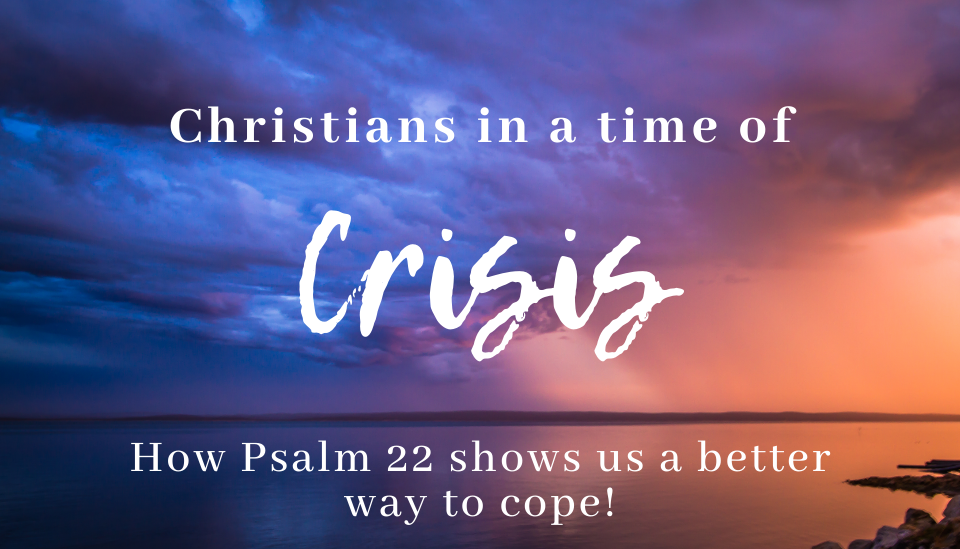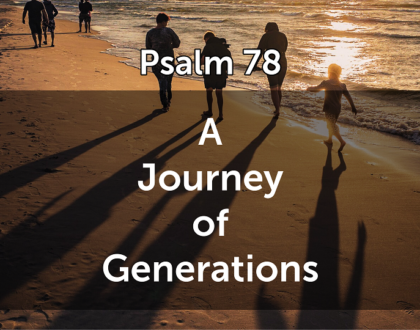Christians in a Time of Crisis

Click “Download” for the application template!
Christians in a Time of Crisis
Psalm 22
29/03/2020
Psalm 23:1-3a
The Lord is my shepherd, I shall not be in want.
He makes me lie down in green pastures, he leads me beside quiet waters, he restores my soul. [1]
Psalm 22:1-2
My God, my God, why have you forsaken me? Why are you so far from saving me, so far from the words of my groaning?
I love the way God arranged for these psalms to sit next to each other in our Bibles!
Sometimes life feels great and we’re seeing plenty of reasons to be thankful and joyful.
Sometimes life feels terrible and we’re seeing plenty of reasons to be anxious and discouraged.
Both these Psalms find their fulfilment in Christ.
Jesus called Himself the Good Shepherd – the One who perfectly expresses God’s faithful care for us.
Jesus also called out the words of Psalm 22 – “My God, my God, why have you forsaken me?” He perfectly expressed our reality that sometimes God feels far away.
How are you going today? What’s your starting point?
Are you starting like Psalm 23 or are you closer to Psalm 22?
Do you know something interesting? They may start in very different places but they finish in the same place – with God being praised for all eternity for the good things He has done.
Today we’re going to see what God will say to us through His Word to help us get to that same end point – praising Him and celebrating His goodness.
The first thing I notice in Scripture is that God wants us to be honest about where we are at.
David is feeling abandoned by God and like his cries for help are falling on deaf ears. He could stuff that feeling down and let it simmer, but what does he do? He addresses his complaint to God. “My God, my God, why have you forsaken me?”
Some people might be inclined to rebuke David at this point.
“How dare you accuse God of forsaking you” they might say.
“God hasn’t moved away from you, you’ve moved away from Him” might be the retort.
Have you ever voiced an uncomfortable emotion or a troubling doubt and feel like you’ve been told off or made to feel guilty for thinking or feeling the way you do?
That’s why you need to know your Bible! It’s normal for God’s people to not always feel close to God. It’s normal to sometimes doubt God’s intentions toward you. That’s our starting point sometimes, but it’s never our destination. God always wants to move us toward peace and joy but you can’t get to your destination if you don’t know where you’re starting from.
God is not surprised when we vocalise our thoughts and feelings. He knows them already! Our heavenly Father wants us to come to Him with our churned up hearts and our confused thoughts so He can help us make sense of them.
That’s what David does next in Psalm 22. He talks about how he feels and then lists the reasons why.
We find out that he’s being publicly mocked and taunted and that strong forces are attempting to overthrow him and take his life. He’s surrounded by enemies.
We too can benefit from getting the worries that circle around in our heads listed out in front of us as we bring them to God.
Over the last couple of weeks we have been hit with levels of change and uncertainty that I don’t think we’ve experienced in several generations.
And it’s no good for people to say “Well it’s not as bad here as over there”, or “You think this is bad, what about back then”, or “You think you’ve got problems, that’s nothing compared…”
The reality is everyone is experiencing this differently, but your starting point is your starting point.
Some of us live alone and are worried about what life might be like as we are increasingly restricted to our homes.
Some of us are managing busy homes with increased responsibility and less external support.
Some of us work in healthcare, aged care, education and other fields where they’re trying to manage things that are increasingly unmanageable.
Some of us are working in industries where work has dropped off and income is uncertain.
Some of us are trying to care for people but it’s hard to work out how to do that in the current environment.
Some of us are trying to figure out how to connect via technology and it’s a scary, foreign thing to us. Some of us are loving that side of things!
We’ve all got a bunch of things that are circling around in our heads and that will inevitably affect how we feel, how we relate to God and others, our sleeping, our eating, our general health and so many other things.
I don’t know about you, but when I’ve got all these worries circling around in my head I tend to find myself imagining how I’ll solve all those problems.
But that’s not why we want to make a list.
You see, this is where being a Christian means we do things differently.
Anyone could tell you about the value of getting your problems out of your head and onto a page so your thoughts stop going around and around and you can systematically make decisions and put things into action.
That’s how we think we’ll deal with our anxieties.
The thing that has terrified us about the coronavirus situation is that it’s exposed the fact that we are not in control.
The fact that we couldn’t rely on our shops to have everything we need has thrown our collective confidence. Most of us have never been through this before.
It is the job of governments to lead us in solving a bunch of the problems that are causing distress in our nation and our world. Romans 13 says that God establishes governments in order to do good for citizens; and our job is to support and help them practically and prayerfully.
But the Church has a higher calling.
The role of the Church is not to restore people’s confidence in ourselves. It’s not to help repaint the illusion that human beings can ever be in control of their own destiny. That our health is going to be great. That our superannuation will be safe. That we’ll be able to find and keep a job or a business. That we’ll enjoy freedom to travel and so on.
The Church’s job is to proclaim a better foundation for life. It’s to point people to the only source of true salvation and security.
That’s what David does in Psalm 22
He’s talked to God about how he’s feeling.
He’s listed the reasons why he’s feeling that way.
That’s what’s going on in the first 21 verses of the Psalm; and mixed in with that are his pleas for God to help him. Yet the tone of these verses is of anxiety, despair, desperation, pleading.
And this is where we often get stuck. We know how we’re feeling, we know why we’re feeling that way and it seems like we’re calling out for rescue and no rescue is coming.
Then things suddenly change in verse 22. Verses 22 to 24 set the tone for the rest of the psalm:
22 I will declare your name to my brothers; in the congregation I will praise you. 23 You who fear the Lord, praise him! All you descendants of Jacob, honor him! Revere him, all you descendants of Israel!
24 For he has not despised or disdained the suffering of the afflicted one; he has not hidden his face from him but has listened to his cry for help.
Let’s just contrast verse 24 with verse 1:
1My God, my God, why have you forsaken me? Why are you so far from saving me, so far from the words of my groaning?
24 For he has not despised or disdained the suffering of the afflicted one; he has not hidden his face from him but has listened to his cry for help.
What’s changed?
Verse 1 set the tone of the Psalm right up to verse 21.
Verse 24 is not a pleading, desperate, anxious cry of a tortured soul. It’s a confident proclamation of someone who is assured of deliverance.
We might be tempted to think that what has changed is that David took a break from writing! He put down his pen after verse 21 and then a few months later when things had all been resolved he read the psalm over & thought “I’d better add in a happy ending. Those people seeking my life didn’t win. The people mocking me had to eat their words. I’m feeling so much better now.”
But that’s not what we read.
What’s changed is what David does in verses 22 & 23. He’s expressed his feelings, he’s listed his reasons, but now he changes gears completely and turns his attention to who God is. He chooses to worship instead of worry!
He’s already been asking God for help… it’s not as if he hasn’t been aware of God. But see in verse 22
“I will declare your name to my brothers…”
In that culture a person’s name expressed something of who they were. There are many names for God that describe His attributes. Provider. Protector. Strong Tower. Holy One. Redeemer. Father. Creator. The list goes on!
When you’re calling out for God to help you in your troubles like David had been up til this point, do you ever stop and realise that your emotions are being influenced more by your troubles than by your God?
Sometimes, like David, we need a bit of a circuit breaker!
We need to start reminding ourselves and those around us exactly who God is. We need to start listing off His attributes. His past actions. His promises for the future.
God is on His throne in Heaven. Is He on His throne in your heart and mind or is something else calling the shots for how you feel and what you do?
If you believe in Jesus, the Holy Spirit is in you to help the condition of your heart reflect the reality of Heaven.
As Christians, we don’t need to wait for circumstances to change in order to experience peace and joy. We don’t need to look at our action plan and be sure that we can control our own destiny or that others will look after us.
In fact, we may even be grateful when we realise that we’ve been tying our sense of wellbeing to things that aren’t actually as reliable as we thought they were. This is a great opportunity for us to make sure our confidence is found in Christ alone.
We want to be able to echo the words of the Apostle Paul in
Philippians 4:11b-13
“…I have learned to be content whatever the circumstances. I know what it is to be in need, and I know what it is to have plenty. I have learned the secret of being content in any and every situation, whether well fed or hungry, whether living in plenty or in want. I can do everything through him who gives me strength.”
Whatever you’re facing at the moment, you can do it through Him who gives you strength.
Know that!
Finally, I’d like you to notice the last thing David does in the psalm.
While continuing to praise God he includes an element that is easy to miss but essential to remember.
He moves from a supplicant who is pleading for help, to a servant who is ready to obey.
Listen to verses 25 to 28
25 From you comes the theme of my praise in the great assembly; before those who fear you will I fulfill my vows.
26 The poor will eat and be satisfied; they who seek the Lord will praise him— may your hearts live forever!
27 All the ends of the earth will remember and turn to the Lord, and all the families of the nations will bow down before him, 28 for dominion belongs to the Lord and he rules over the nations.
So here’s the summary of the normal response to crisis and the Christian response:
Normal response:
- I feel churned up
- I have a bunch of things on my mind
- I’m doing all I can to bring life back under control (with help from…)
- If I succeed I’ll feel better
“Natural” Christian Response to Crisis: (what we tend to do if we’re left to ourselves)
- I feel churned up
- I have a bunch of things on my mind
- I’m pleading with God to bring my life back under control
- If things get better I’ll praise Him and serve Him.
Mature Christian response: (what God has shown us in His word is a better way)
- I feel churned up
- I have a bunch of things on my mind
- As I worship God I begin to experience a lifting of my burdens
- I’m now free to joyfully serve God as I do the good works He planned in advance for me to do.
Application Activity
Here’s an activity that you can use to help you work through a process like David did in Psalm 22.
You might do this on your own or like David you could go public and do it with others. I think it’s worth doing both!
(template at end of manuscript)
1) How I’m Feeling
Remember Jesus quoted Psalm 22:1 when He was on the cross. He knows what it feels like to be overwhelmed with sorrow and anxiety. He sweated drops of blood as the time for His crucifixion drew near.
Be open and honest and know that God understands and cares.
Remember too that while we sometimes feel abandoned by God, Jesus actually was abandoned for a time by His Father. While we may feel abandoned we know that God has promised to never leave us or forsake us (Hebrews 13:5). We know this is true because Jesus took on the separation we deserve from God because of our sin. He was forsaken for a time so we would never be forsaken. God loves us enough to do that.
2) What I’m Facing
What are those past wounds, current circumstances and fears for the future that are causing your emotions to be stirred up? List them out no matter how big or small. Fear, shame & despair like to grow in the dark. Bring everything that could cause these things to grow out into the light.
3) Who I’m Trusting
Let’s now change gears and just think about God.
First change out of the gear you were just in. Stop listing off problems and focussing on your feelings. That’s not wrong to do but we’re past that stage.
Turn off the news, your social media feed, your own circling thoughts.
It might be a time to confess to God that you’ve been putting your trust in stuff that’s not actually worthy of it.
Now shift out of that gear.
Shift into the gear of thinking about God.
What about God do you want to proclaim to yourself and/or others right now?
Don’t rush this. Search Scriptures. Pray with a listening heart.
Your mind will want to change back to the other gear, persevere in only thinking, writing and speaking about who God is, what He’s done and what He’s promised to do.
Think about where you will do this. Where can you go where you won’t be interrupted? What sights, smells and sounds remind you of God and don’t steer you back toward your struggles?
Pay attention to what’s happening in your heart as you do this. Do you feel a change beginning?
4) How I’m Obeying
The energy behind your activity now comes from a wholly different place. Instead of frantically trying to bring life back under control you are able to joyfully do what your loving, wise and good King calls you to do. Perfect love drives out all fear, and God has loved you perfectly. Now you get to love Him and love others in return – how is He asking you to do that?
This is a good time to go back to that list of problems you’re facing. Are there some things God is asking you to leave with Him? Are there some things God is asking you to do something about? Are there some problems that someone else is facing that God is wanting you to do something about?
The good news is that you are not in control and you don’t need to be. It’s enough to just do what God asks you to do.
Prayer
Thankyou Lord that you are always at work for the good of those who love you, who have been called according to your good purpose (Romans 8:28-29)
Thankyou that this time of upheaval gives us an opportunity to evaluate our lives to see whether we are truly living by faith in Jesus or whether we are conforming to the pattern of this world.
Refine us we pray. Purify our hearts. Make us more like Jesus. Build us on the solid foundation of Christ alone.
Amen
[1]All Scriptures taken from The Holy Bible: New International Version. (1984). Grand Rapids, MI: Zondervan.
Recent Sermons

A Journey of Generations
April 21, 2024

Psalm Sunday Scandal
March 25, 2024

New Life in Jesus pt 2: Courage to Die.
March 17, 2024

